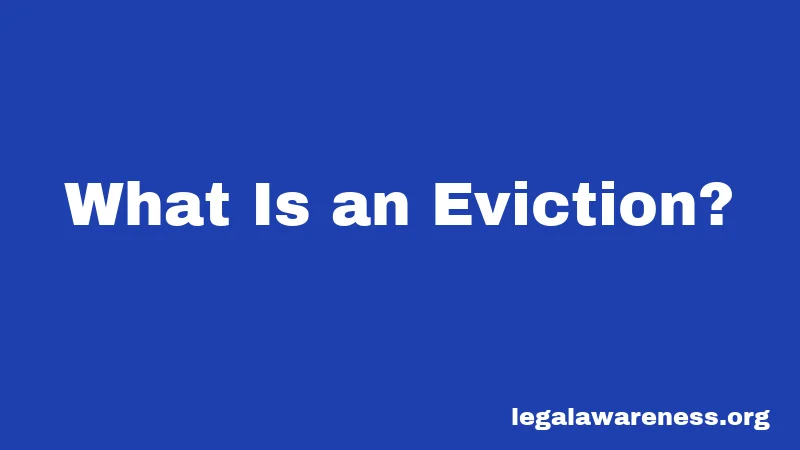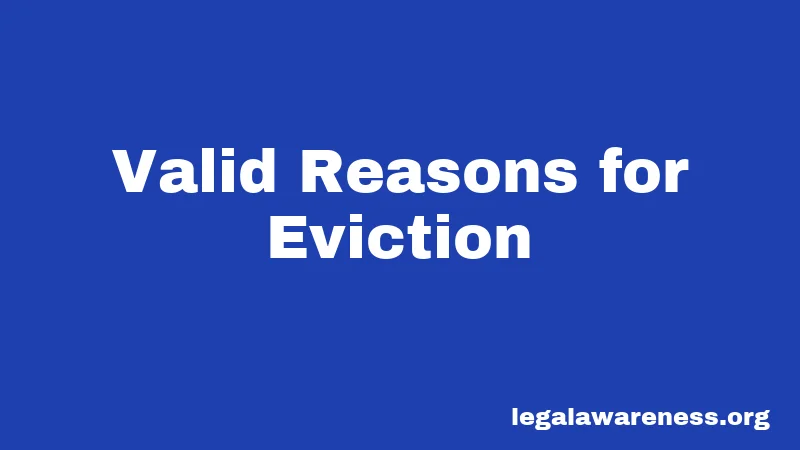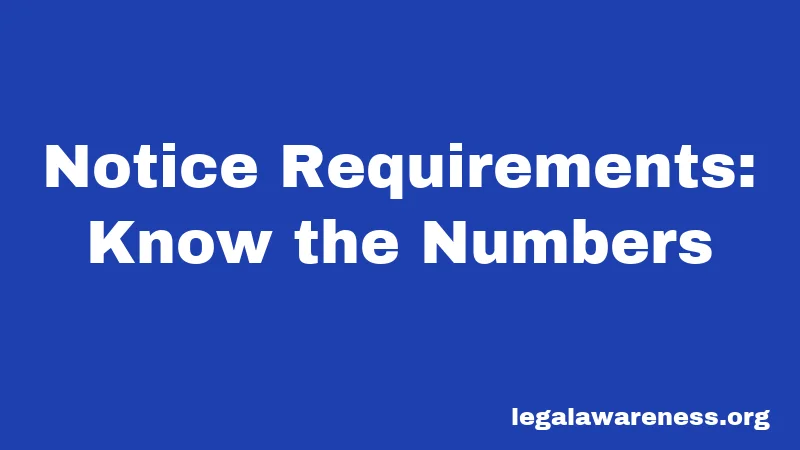Eviction Laws in Washington (2026): Know Your Rights and Responsibilities
Most people have no idea how strict Washington’s eviction laws are. Seriously. But whether you’re a landlord dealing with non-payment or a tenant worried about losing your home, understanding these rules is essential. This stuff is important.
In Washington State, evictions aren’t something you can rush into. The law requires landlords to follow very specific steps, and breaking those rules comes with serious consequences. Let’s break down exactly what you need to know.
What Is an Eviction?

An eviction is the legal process landlords use to remove tenants from rental properties. Think of it like a court-ordered removal. A landlord can’t just change the locks or kick someone out. They have to go through the court system.
This matters because Washington law protects both landlords and tenants. Landlords get a clear legal path to regain their property. Tenants get important protections and the right to defend themselves in court.
Just Cause: The Core Rule
Here’s where it gets critical. In Washington, landlords cannot evict tenants without a valid legal reason. This is called “just cause.”
This rule applies to all tenants after they’ve lived in a unit for more than six months. After that point, a landlord can’t evict someone just because they feel like it. They need a real reason.
Wait—this is important. New tenants under six months? Different rules apply. But honestly, most evictions happen after that six-month mark, so focus on what comes next.
Valid Reasons for Eviction

So what counts as a valid reason? Here are the main ones.
Non-Payment of Rent
This is the most common reason for eviction. If rent is late by even one day (unless your lease says otherwise), you’re in breach. Landlords must give a 14-day written notice to pay or quit. You get 14 days to pay what’s owed. If you do, the eviction stops. Pretty straightforward.
Lease Violations
Breaking the lease rules is another valid reason. These include unauthorized pets, smoking in non-smoking units, property damage, or extra occupants. Not sure what counts as a violation? Check your lease agreement. It should spell everything out.
The notice required depends on whether the violation is fixable. Things like extra people or unapproved pets can be fixed. The landlord has to give you a 10-day notice to remedy the breach. You have 10 days to fix it.
Non-Curable Violations (The Serious Ones)
Some violations can’t be fixed. These include illegal activity, running an unauthorized business, or creating hazardous conditions. These get a 3-day notice to quit. You must vacate within three days. No fixing it. No second chances.
Criminal Activity
If someone in the rental unit commits a crime, the landlord can act fast. This includes drug-related activity, gang activity, or other unlawful actions. Okay, pause. This one is serious and specific. The activity has to actually occur at the property.
Property Damage
Renters must maintain the unit. If you cause damage beyond normal wear and tear, the landlord can evict. This means breaking fixtures, walls, or creating unsafe conditions. Taking photos and keeping documentation matters if you’re a landlord. You’ll need proof.
End of Lease (No-Fault Termination)
If your lease is ending and the landlord just doesn’t want to renew, they need to give 20 days’ notice. But hold on—this only works if the tenant hasn’t lived there more than six months. After six months, the landlord needs just cause.
The Eviction Process Step by Step
Understanding the timeline helps. Here’s how it actually works.
Step 1: Serve Written Notice
Everything starts with written notice. The notice type depends on the violation. You get either 3, 10, 14, or 20 days depending on the reason. This notice must be in writing and delivered correctly. Email doesn’t cut it.
Step 2: Wait the Notice Period
Now comes the waiting game. If it’s a 14-day notice for non-payment, you have 14 days to pay or leave. If you pay the full amount owed within this window, the eviction stops completely. The process ends.
Step 3: File the Unlawful Detainer
If the tenant doesn’t comply, the landlord files an unlawful detainer action in court. This is a legal lawsuit asking the court to remove the tenant. The landlord files paperwork and pays court fees.
Step 4: Serve the Tenant
The court paperwork (called a Summons and Complaint) gets served on the tenant. It must be delivered at least two days before the court hearing. The landlord can have a sheriff deliver it, or someone over 18 who’s uninvolved in the case.
Step 5: Tenant Response
Once served, the tenant has seven to 30 days to file a written answer with the court. Tenants can contest the eviction here. They can argue the notice was wrong, that they fixed the violation, or that the landlord is breaking the law.
Step 6: Court Hearing
If the tenant responds, there’s a hearing. The judge or court commissioner hears both sides. Landlords must prove their case. Tenants can present defenses. If the judge agrees with the landlord, they issue a judgment for eviction.
Step 7: Writ of Restitution
This is the final step. After judgment, the court issues a writ of restitution. This is the official order that lets the sheriff remove the tenant. The sheriff oversees the actual removal.
The whole process typically takes one to three months. Court schedules can slow things down. Every case is different.
Notice Requirements: Know the Numbers

Wondering which notice applies to you? Here’s the breakdown.
14-Day Notice: Non-payment of rent. You get two weeks to pay or leave.
10-Day Notice: Fixable lease violations. Time to correct the issue.
3-Day Notice: Severe violations like illegal activity. No fixing allowed.
20-Day Notice: End of lease (only within first six months).
60-Day Notice: Month-to-month lease, no-cause termination (only after tenant has lived there more than six months and landlord has just cause).
These numbers matter. Giving the wrong notice or waiting the wrong amount of time can get the entire eviction thrown out. Landlords need to be precise.
Illegal Eviction Tactics: What’s Absolutely Not Allowed
Let me be crystal clear. Landlords cannot remove tenants without court involvement. Period.
Changing locks? Illegal. Turning off utilities? Illegal. Removing belongings? Illegal. Threatening the tenant? Illegal. These are called “self-help evictions,” and Washington has zero tolerance for them.
If a landlord tries any of these tactics, the tenant can call the police. The tenant can also sue. And that lawsuit can be very costly for the landlord.
A tenant who successfully sues for wrongful eviction can recover the greater of their actual damages or three times the monthly rent. They also recover attorney’s fees and court costs. Sound complicated? It’s actually quite serious.
Retaliation and Discrimination: Protected Rights
Here’s something most people don’t realize. Landlords cannot retaliate against tenants for asserting their legal rights.
If you complain about repairs needed, ask about a lease term, or join a tenants’ union, the landlord cannot evict you in retaliation. If the landlord serves an eviction notice within 90 days of you asserting your rights, it’s presumed to be retaliation. The tenant can fight it in court.
Discrimination is also banned. Evictions based on race, color, religion, national origin, sex, disability, or familial status violate federal and state law. These are serious violations with big consequences.
Penalties for Wrongful Eviction
So what happens if a landlord breaks these rules? It gets expensive. Fast.
If a landlord violates eviction laws, the tenant prevails in court, that tenant gets serious damages. They recover the greater of actual damages or three times the monthly rent. Plus attorney’s fees and court costs.
Think of it like this: If monthly rent is $1,500 and the landlord wrongfully evicts, the tenant could recover $4,500 just from the multiplier. That’s on top of any other damages proven in court. This is not a joke for landlords.
Self-help evictions carry similar penalties. Lock someone out illegally? Same consequences. Change locks? Same thing. The law doesn’t mess around.
Tenant Protections and Resources
As a tenant, you have real protections in Washington. You’re not powerless here.
First, you have the right to contest an eviction in court. You can file a written answer. You can present evidence. You can challenge whether the landlord followed the law.
Second, you have access to legal help. Washington state provides legal representation for low-income renters facing eviction. Ask the court about it. You might qualify.
Third, rental assistance exists. If you’re behind on rent, state and local programs can help you catch up. This can literally stop an eviction even after the 14-day period ends. The landlord must wait seven court days if you’re applying for assistance.
Fourth, you have protection against retaliation and discrimination. These violations are serious, and the law backs tenants up.
Recent Changes and 2026 Updates
Washington is constantly updating its landlord-tenant laws. As of 2026, here’s what’s new or changing.
Security deposit rules got stricter. Landlords now have 30 days (not 21) to return deposits after you move out. That’s longer than before. They also need to provide a written checklist of the unit’s condition when you move in, and you have to sign it. That protects both of you.
Eviction reform legislation is in the works. Senate Bill 5740 is being considered for 2025-2026. It focuses on eviction reform and tenant safety. Some provisions might take effect January 1, 2028. This bill could change how evictions work, so stay tuned.
Rent increase rules also apply in some areas. If you live in a city with rent control ordinances, limits may apply to how much your rent can increase. Check your local city laws. Seattle and other cities have specific rules.
How to Respond If You’re Evicted
Getting an eviction notice? Don’t panic. Here’s what to do.
Step 1: Read It Carefully
Make sure the notice is correct. Check the date. Check the reason. Check that it was served properly. Any mistakes help your case.
Step 2: Pay If You Can (For Non-Payment)
If it’s a non-payment notice, paying the full amount stops the eviction cold. Get proof of payment. Keep documentation. Send it to the landlord in writing if possible.
Step 3: Fix the Violation (If It’s Fixable)
For lease violations, fix the problem within the notice period. Remove the unauthorized pet. Stop the smoking. Clean up damage. Document your fixes with photos or written confirmation.
Step 4: Gather Your Evidence
Keep all communications with your landlord. Collect photos, text messages, emails, proof of payments, and witnesses. This stuff wins cases.
Step 5: Seek Legal Help
Contact a legal aid organization. Many are free for low-income tenants. The court can also appoint a lawyer if you qualify. Take this seriously.
Step 6: File Your Response
If evicted papers get served, you have seven to 30 days to file a written answer with the court. This response must dispute the eviction. File on time. Missing the deadline is bad.
Landlord Best Practices
If you’re a landlord, here’s how to do this right.
Document everything. Keep rent records, lease copies, photos of damage, dated written communications. This is your evidence in court. Without it, you lose.
Follow notice requirements exactly. Use the right notice type. Wait the right amount of time. Serve it correctly. Any mistake gives the tenant a defense.
Keep records of lease violations. Write them down when they happen. Give written warning notices. Follow your lease terms on consequences. Don’t make up reasons or exaggerate facts.
Don’t attempt self-help evictions. Ever. It costs thousands in potential liability. Use the court system. It’s there for you.
Consider mediation or resolution centers. Pierce County and others have dispute resolution centers. They can help both sides reach agreements faster than court. This saves money and time.
Consult an attorney if you’re unsure. Hiring a lawyer for a $500 eviction is smarter than losing a $50,000 wrongful eviction lawsuit. It’s worth the cost.
Frequently Asked Questions
Can a landlord evict someone without going to court?
No. Absolutely not. Every eviction requires a court order in Washington. Self-help evictions are illegal and carry serious penalties.
How long does an eviction take in Washington?
It typically takes one to three months from initial notice to actual removal. Court schedules vary, and tenants’ responses can delay things.
Can a tenant stop an eviction after it’s filed?
Yes. If it’s a non-payment case, paying the full amount owed plus a $75 fee stops it. Rental assistance applications also trigger a waiting period.
What’s the difference between a 3-day and 14-day notice?
A 3-day notice is for serious violations (illegal activity, non-curable breaches). A 14-day notice is for non-payment of rent. It’s the most common notice type.
Can a landlord evict for any reason?
Not after six months of tenancy. After that, landlords need just cause. Within six months, different rules apply for some situations.
Final Thoughts
Washington’s eviction laws protect both sides, but they require following the rules carefully. As a landlord, precision matters. Mistakes cost money and time. As a tenant, you have real rights and defenses. Use them.
The best approach? Communicate clearly from day one. Pay rent on time. Maintain the property. Follow lease terms. Keep things in writing. Most evictions are preventable with clear expectations and good faith effort.
If you’re facing eviction or need to evict someone, get professional help. Talk to a lawyer. Consult legal aid. Use the resources available. Washington courts are there to ensure fairness. Use them right.
Now you know the basics. Stay informed, stay safe, and when in doubt, look it up or ask a lawyer.
